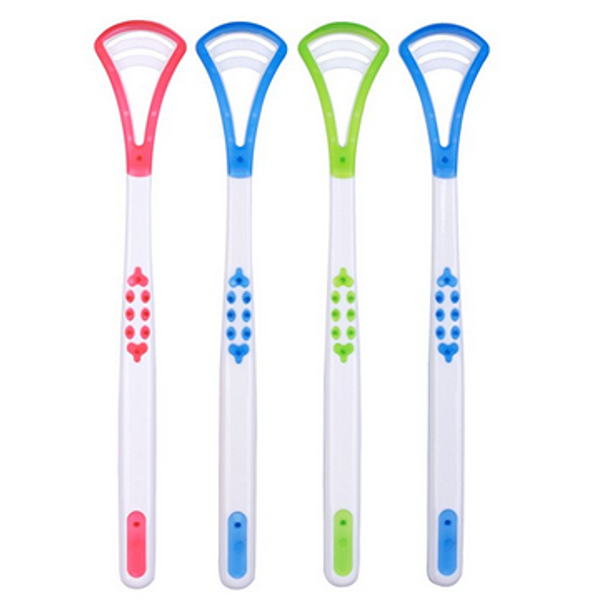
Should I Add Tongue Scraping Into My Dental Routine?
During your hygiene appointments, we frequently talk about your brushing and flossing routines. But, what about your tongue? It plays a critical role in your mouth and overall health. Find out why and how to keep it in shape.
The tongue is at the front line of the immune system and protects us against harmful bacteria entering our mouth when we eat and drink. Germs can travel from the mouth to other organs and cause disease, so keeping a consistent mouth cleaning routine is key not only for your teeth but for your overall health. That’s why Dr. Brunacini, Dr. Karagiorgos, and our team of wonderful hygienists recommend adding tongue scraping after brushing and flossing your teeth every day. It will only add one to two extra minutes to your routine and bring you a lot of benefits. Read on to learn more!
BENEFITS OF TONGUE SCRAPING
- Improves digestion. Your digestive process starts in the mouth and guess what happens when debris, bacteria and dead cells build up on your tongue? Saliva activation doesn’t work as well and your digestion suffers. However, when you scrape your tongue you clear out these blockages so your mouth can produce the correct amount of saliva and digestion can function properly.
- Helps prevent and reduce bad breath. In some people, the accumulation of bacteria in the mouth causes bad breath. Using a tongue scraper consistently will help remove it, and you will have a fresher breath!
- Boosts your immune system. We often talk about how a good oral health routine contributes to your overall health, and tongue scraping is a part of that. By scraping the tongue you will avoid the reabsorption of toxins, so that your immune system won’t be so busy dealing with them and will have more resources available to fight any other germs!
- Boosts up your sense of taste. When you scrape your tongue your taste buds will be freed of blockages and have direct contact with food again. Are you ready to rediscover how pepper, lemon or ginger really taste?
HOW TO SCRAPE YOUR TONGUE
Tongue scraping is easy! There is no secret to it, but there are a few details that we think are important for you to know, so that you make the most of it. Here’s the basic how-to:
- Touch the scraper to the back of your tongue with a little pressure and pull it forward. Always go from back to front. Scrape a few times until you make sure that you have covered all the surface.
- When you are done, wash the scraper with soap and keep it on a clean surface.
If you want to add tongue scraping into your cleaning routine, let us know and we are happy to give you a plastic tongue scraper to get you started! However, if you want to buy a copper scraper, that is also a good option. No matter what your choice is, know that washing your tongue with a toothbrush doesn’t work. Our hygienists are always happy to provide a demonstration, so please don’t hesitate to ask at your next appointment!
It’s easy to upgrade your daily oral health care routine with tongue scraping.Try it for a week and let us know about your experience! And as always, reach out to Dr. Brunacini or Dr. Karagiorgos with any questions or concerns. We’re your partners in oral health and here to help!
*Image courtesy of www.walmart.com
